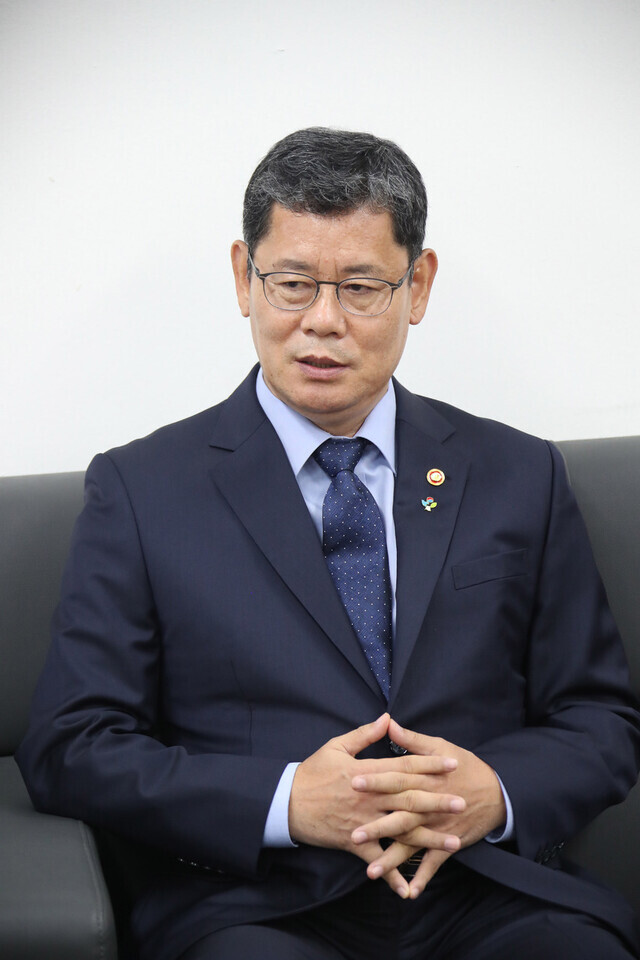hankyoreh
Links to other country sites 다른 나라 사이트 링크
Unification Minister announces resignation to bring change in inter-Korean relations

When Unification Minister Kim Yeon-chul offered to resign on June 17, he gave two main reasons. First, he said he should step down to take full responsibility for the deterioration of inter-Korean relations. Second, he said it was his duty, under the current circumstances, to create a change of mood.
As alarm bells grow louder, this voluntary resignation by the cabinet member responsible for inter-Korean relations and North Korean policy reflects a determination to interrupt the vicious cycle in inter-Korean relations and lay the foundation for turning the situation around. Kim’s resignation can be seen as expressing Seoul’s hope that North will take a breather.
Kim’s decision to submit his resignation was abrupt and unexpected, given South Korean President Moon Jae-in’s typical approach to personnel decisions as well as recent developments. Noh Ung-rae, an influential lawmaker with the ruling Democratic Party, who is now in his fourth term in office, wrote on Facebook that Kim should stay in office. “Dialogue is necessary even during a war, which is not a good time to replace your general. The optics aren’t good, and neither is the timing,” Noh said.
A Blue House official only noted “the resignation of a cabinet matter is a decision to be made by the person with responsibility for personnel decisions” — that is, the president — and that the decision would be announced as soon it was made. But Kim’s resignation is a fait accompli; he’s apparently planning to hold a farewell ceremony on June 18.
Rather than sticking around until his replacement is officially appointed, following hearings in the National Assembly, Kim seems intent on swiftly making his resignation a reality. This represents the last sacrifice he can make as unification minister to prevent inter-Korean relations from deteriorating further.
Officials at the Blue House haven’t hinted at the possibility of the president turning down Kim’s resignation. It’s more likely that Moon will move quickly to find a replacement in order to create the “change of mood” that Kim desires.
Chances are that the next unification minister will be a leading politician with a knack for getting things done. Even before the recent crisis, there had been much talk about the need for a unification minister with a background in politics, the kind of person who could break out of the stalemate in inter-Korean relations. That’s something that many feel the unification ministers in the initial and middle phases of Moon’s presidency — a career bureaucrat (Cho Myoung-gyon) and an inter-Korean expert (Kim Yeon-chul) — have failed to do.
Some of the leading contenders for the position are Lee In-yeong and Woo Sang-ho, both Democratic Party lawmakers who have served as floor leader and who have considerable interest in inter-Korean relations. Another potential candidate is Lim Jong-seok, who was closely involved in the three inter-Korean summits while serving as Moon’s chief of staff. But Lim reportedly prefers working to improve inter-Korean relations in the private sector, rather than in the cabinet.
By Lee Je-hun, senior staff writer
Please direct comments or questions to [english@hani.co.kr]

Editorial・opinion
![[Column] Life on our Trisolaris [Column] Life on our Trisolaris](https://flexible.img.hani.co.kr/flexible/normal/500/300/imgdb/original/2024/0505/4817148682278544.jpg) [Column] Life on our Trisolaris
[Column] Life on our Trisolaris![[Editorial] Penalties for airing allegations against Korea’s first lady endanger free press [Editorial] Penalties for airing allegations against Korea’s first lady endanger free press](https://flexible.img.hani.co.kr/flexible/normal/500/300/imgdb/original/2024/0502/1817146398095106.jpg) [Editorial] Penalties for airing allegations against Korea’s first lady endanger free press
[Editorial] Penalties for airing allegations against Korea’s first lady endanger free press- [Editorial] Yoon must halt procurement of SM-3 interceptor missiles
- [Guest essay] Maybe Korea’s rapid population decline is an opportunity, not a crisis
- [Column] Can Yoon steer diplomacy with Russia, China back on track?
- [Column] Season 2 of special prosecutor probe may be coming to Korea soon
- [Column] Park Geun-hye déjà vu in Yoon Suk-yeol
- [Editorial] New weight of N. Korea’s nuclear threats makes dialogue all the more urgent
- [Guest essay] The real reason Korea’s new right wants to dub Rhee a founding father
- [Column] ‘Choson’: Is it time we start referring to N. Korea in its own terms?
Most viewed articles
- 1New sex-ed guidelines forbid teaching about homosexuality
- 260% of young Koreans see no need to have kids after marriage
- 3[Column] Life on our Trisolaris
- 4OECD upgrades Korea’s growth forecast from 2.2% to 2.6%
- 5Presidential office warns of veto in response to opposition passing special counsel probe act
- 6Months and months of overdue wages are pushing migrant workers in Korea into debt
- 7[Guest essay] Maybe Korea’s rapid population decline is an opportunity, not a crisis
- 8Trump asks why US would defend Korea, hints at hiking Seoul’s defense cost burden
- 9[Editorial] Penalties for airing allegations against Korea’s first lady endanger free press
- 10Japan says it’s not pressuring Naver to sell Line, but Korean insiders say otherwise